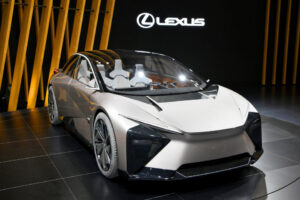In a significant shift in strategy, Toyota has announced a delay in its plans to begin electric vehicle (EV) manufacturing in the United States, a move that underscores the current challenges facing the automotive industry. As global demand for battery-powered vehicles softens, the Japanese automotive giant has pushed back its production timeline from late 2025 or early 2026 to an unspecified date in 2026. This decision highlights the shifting landscape of the EV market, where even industry leaders are grappling with changing consumer preferences and economic pressures.
The Current State of the EV Market
The global electric vehicle market, which had been experiencing rapid growth, is now facing a series of headwinds. A combination of economic uncertainty, fluctuating raw material prices, and evolving consumer preferences has led to a decrease in demand for electric vehicles in key markets. Toyota’s announcement comes in the wake of similar decisions by other major manufacturers, including Ford and Volvo, who have also revised their electric vehicle strategies.
For many automakers, the excitement surrounding electric vehicles has been tempered by the reality of a competitive and sometimes unpredictable market. Tesla, the industry leader in EVs, reported disappointing quarterly figures that missed Wall Street expectations, raising concerns about its first-ever decline in annual deliveries. This has sent ripples through the automotive industry, prompting companies to reassess their strategies.
Toyota’s Commitment to Electric Vehicles
Despite the setback, Toyota remains steadfast in its commitment to electric vehicles. The company has reiterated its ambitious target of producing 1.5 million battery electric vehicles by 2026. Scott Vazin, a spokesperson for Toyota, emphasized the company’s dedication to the EV market, stating, “We’re still focused on our global [battery electric vehicle] target of 1.5M vehicles by 2026.” Toyota plans to introduce between five to seven new battery electric vehicle models in the U.S. over the next two years, signaling that it still sees potential in the market despite the challenges.
Toyota’s strategic focus includes significant investments in its manufacturing capabilities. Earlier this year, the company announced a $1.3 billion investment in its Kentucky factory, where it plans to produce a new three-row electric SUV. Additionally, Toyota is establishing another electric model at its plant in Indiana. This proactive approach aims to bolster its position in the evolving EV landscape, even as production timelines are adjusted.
The Challenges Facing Toyota
The decision to delay U.S. EV production is not merely a reflection of Toyota’s strategic considerations but also an acknowledgment of the broader challenges within the automotive sector. Many automakers are grappling with what has been termed “pricing and margin compression.” This phenomenon occurs when the costs of producing electric vehicles rise, while consumer interest or willingness to pay does not keep pace, leading to slimmer profit margins.
Ford’s recent announcement to overhaul its electric vehicle strategy, which included scrapping plans for a large all-electric SUV and postponing the launch of its next electric pickup truck, illustrates the pressure facing the industry. Chief Financial Officer John Lawler stated that the company is adjusting its plans in response to the current market environment. This trend is echoed by Volvo, which abandoned its goal of exclusively producing fully electric cars by 2030, instead opting to include hybrids in its lineup due to changing market conditions.

Investing in Battery Production
To support its EV goals, Toyota is ramping up its lithium-ion battery production capabilities. The company is constructing a new battery manufacturing facility in North Carolina, which is expected to come online next year. This investment underscores Toyota’s recognition of the critical role that battery technology plays in the success of electric vehicles. As the industry shifts towards electrification, having a robust and efficient battery production infrastructure will be essential for any automaker looking to compete.
The establishment of battery production facilities is not just about meeting immediate demands; it’s about ensuring long-term sustainability and competitiveness. By investing in local production, Toyota aims to reduce supply chain vulnerabilities that have been highlighted in recent years, particularly during global disruptions.
The Future of Electric Vehicles
As the automotive industry adapts to a rapidly changing landscape, the future of electric vehicles remains both promising and uncertain. While current market conditions have prompted some automakers to scale back their ambitions, the long-term trajectory still points towards increased electrification. Consumer preferences are evolving, with many buyers now considering electric vehicles as viable options for their next purchase.
However, for automakers like Toyota, the path forward will require agility and innovation. Companies must navigate not only the technological challenges of EV production but also the market dynamics that can shift quickly. A robust strategy that encompasses product development, supply chain management, and consumer engagement will be crucial for success in this competitive arena.
Conclusion
Toyota’s decision to delay its U.S. electric vehicle manufacturing plans highlights the complexities of the current automotive market. As the company reassesses its strategy in light of global demand fluctuations, it remains committed to its electric vehicle goals. By investing in manufacturing capabilities and enhancing battery production, Toyota aims to position itself for future success in the electric vehicle space.
The automotive industry is at a crossroads, and the decisions made today will shape the landscape of tomorrow. With changing consumer preferences, economic pressures, and evolving market conditions, the path forward for electric vehicles will require innovation, flexibility, and a deep understanding of the emerging dynamics at play. As Toyota and other automakers navigate these challenges, the future of electric mobility remains a critical focus, one that will undoubtedly continue to evolve in the coming years.
In conclusion, while the road ahead may be fraught with challenges, the commitment to electric vehicles is clearer than ever. As consumers demand more sustainable and efficient transportation options, the race to lead in the electric vehicle market is only just beginning. Toyota’s strategic moves, alongside its competitors, will play a pivotal role in defining the future of mobility in an increasingly electrified world.
‘
